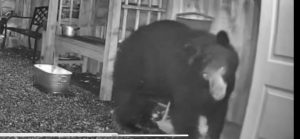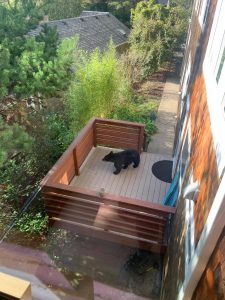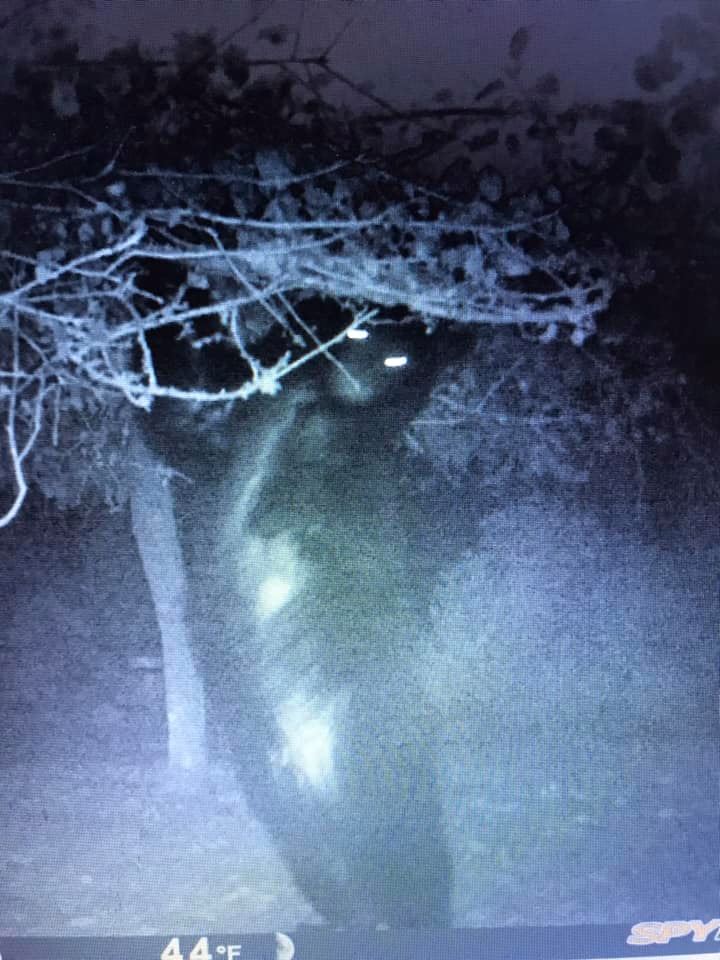Black bears have been sighted wandering neighborhoods from Manzanita to Neskowin – and places in-between. We have an annual visit from “generational” bears here on our acreage, and they are coming for our apple trees. See below of tips and more information about how to discourage bear visits. Any time experiencing wildlife in action is a special moment – remember that we are invading their territory. Most importantly, give the bears plenty of space, make sure to keep you dogs secure (most black bear incidents between humans have involved dogs) and be bear aware.


Oregon is home to about 25,000 to 30,000 black bears, North America’s most common bear species. Generally black in color, they can also be brown, cinnamon or blond. Fast and agile, they are good swimmers and climbers who prefer forests, trails and streams. At home throughout Oregon, black bears are omnivorous and have a diverse diet including berries, fruit, grasses and plants. Although they will consume small mammals, insects and amphibians, these bears are not usually active predators.
Bears should never be allowed access to human food or garbage; it habituates them to people and increases the chance of conflict. Once habituated to finding food near homes or campgrounds, bears can become a threat to human safety and must often be destroyed.
Is it a black bear or a grizzly bear?
Oregon is black bear country. Although native to the area, there are no longer grizzly bears in the state. The last grizzly bear recorded was killed in the late 1930s at Billy Meadows, north of Enterprise in Wallowa County. However, because black bears are often brown, people sometimes wonder what species of bear they have seen. Here is some information on bear identification.
BLACK BEAR GRIZZLY BEAR Q. Grizzly bears are brown and black bears are black. Right? A. Not really. Grizzly bears can be brown, blond, grey, reddish or sliver tipped. Black bears can be blond, cinnamon, brown or black. Q. Aren’t grizzly bears bigger than black bears? A. Don’t count on it. On average grizzly bears are larger than black bears however there is much variation in size among bears of both species. It is also very difficult to accurately estimate the size of a bear in the wild. Q. How can I tell the difference? A. There are no grizzly bears in Oregon so if you see a brown bear in Oregon, it is a black bear. Grizzly bears are being recovered in Washington State in the North Cascades.
- Grizzly bears have a distinctive shoulder hump. Black bears don’t.
- Comparatively, grizzly bears have short and round ears while black bears have large, pointed ears.
- In profile, the face of a grizzly bear is more concave (dish shaped) and broader than the black bear’s which is straighter and narrower.
- The footprints of grizzly bears and black bears differ. View bear tracks (gif)
Q. Where can I get more information? A. Take an online bear ID test:
Bear resistant containers and garbage cans
 |
| Black Bear in the trash – Photo by Donna Weaver – |
While ODFW has not tested these bear-proof products, a number of groups have.
For a current list of Sierra Interagency Black Bear Group Approved Bear-Resistant Food Storage Containers see the Sierra Nevada Wild website. Among the suppliers are:
Products that have passed inspection under the Interagency Grizzly Bear Committee Testing Program can be viewed at the Interagency Grizzly Bear committee website. Among the suppliers are:
Homeowner Checklist
Bear proofing your yard and neighborhood can help avoid potentially dangerous bear encounters and keep Oregon’s bears safe and where they belong – in the wild.
Most problems are caused by people feeding bears, either actively or inadvertently. Once habituated to finding food near homes, bears can become a threat to human safety and must often be euthanized. Follow these guidelines to protect both humans and bears.
- Keep pet food indoors. Feed pets in the house, garage or enclosed kennel.
- Hang bird feeders from a wire at least 10 feet off the ground and 6 to 10 feet from the trunk of tree.
- Remove fruit that has fallen from trees.
- Add lime to compost piles to reduce odors ― do not compost meat, bones, fruit, dairy products or grease.
- Secure garbage cans in a garage, shed or behind a chain link or electric fence.
- Put garbage cans out just before pick-up time, not the night before.
- Purchase bear-proof garbage cans if necessary.
- Take garbage with you when leaving your vacation home.
- Clean garbage containers regularly with bleach or moth balls to reduce odors.
- Use electric fencing to keep bears from orchards, gardens, compost, beehives and berries.
- Store livestock food in a secure place.
- Don’t leave scented candles, soap or suntan lotions outdoors or near open windows.
- Keep barbeques clean. Store them in a shed or garage.
- Talk to neighbors to encourage everyone in the neighborhood to remove attractants.
- Stay indoors and allow a snooping bear to move on.
- Never, ever feed a bear.
- Teach children about bear safety.
Contain food and garbage
- Store food in airtight containers in the trunk of your car, in bear boxes or on platforms
- Hang food bagged food 10-12 feet high and 6-10 feet from tree trunk or side support.
- Do not leave food items or pet food outdoors or in tents.Clean all food preparation and eating utensils immediately after using them, and place them in vehicles or other sealed, bear-proof containers.
- Dispose of garbage in bear-proof cans or pack it out.
- Do not bury garbage ― bears will dig it up.
Camp safely
- Keep campsites and campfire areas clean.
- Sleep at least 100 yards from cooking/eating areas.
- Keep dogs on leashes or in cars.
- Never pick up a bear cub ― its mother has left it there and will return.
- Stay clear of berry patches.
- Don’t leave soap, suntan lotion, candles, scented items outdoors or in tent.
- Pitch your tent away from dense brush or trees ― avoid what might be an animal trail to a river or stream
- Use a flashlight at night.
- Don’t camp or hike alone.
- Teach children about bear safety.
Hike safely
- Avoid trails with bear tracks or bear sign.
- Make noise when hiking so as not to surprise a bear.
- If you see a bear, leave the area.
- Stay far away from cubs―mother is nearby.
- Leash dogs. A loose dog may lead a bear back to you.
- Don’t hike after dark.
- Consider carrying bear spray in areas known to have bears
Angler, Hunter Guidelines
Fishing or hunting in bear country, brings some additional challenges, so take extra caution.
Manage food and refuse
- Keep food in bear-proof containers.
- Place all garbage and fish refuse in sealed, bear-proof containers.
- Keep campsites, campfire sites clean.
- Do not bury garbage or fish refuse; bears will dig it up.
Be safe while fishing
- Fish with at least one other person
- Talk loudly around a stream – carry a whistle to use to alert bears of your presence.
- Avoid berry patches
- If you see a bear or fresh bear sign, leave the area
- Clean fish at designated cleaning stations.




